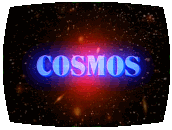The Shores Of The Cosmic Ocean
 Dr. Carl Sagan introduces the concept of the dandelion-like Ship of the Imagination, as well as the idea of Earth as an island in the sea of space. He then discusses the scientific work of the Greek mathematician Eratosthenes, who came very close to correctly calculating Earth’s circumference, axial tilt, and distance from the sun in approximately 100 B.C., and explores a recreation of the Library of Alexandria, over which Eratosthenes presided. The wealth of knowledge at Alexandria, the loss of the documents in the library, are described, along with Eratosthenes’ effect on the work of centuries of later astronomers, from Aristarchus to Copernicus to Kepler…but the short span of this era of astronomical knowledge is also contrasted with the vast scale of the age of the universe.
Dr. Carl Sagan introduces the concept of the dandelion-like Ship of the Imagination, as well as the idea of Earth as an island in the sea of space. He then discusses the scientific work of the Greek mathematician Eratosthenes, who came very close to correctly calculating Earth’s circumference, axial tilt, and distance from the sun in approximately 100 B.C., and explores a recreation of the Library of Alexandria, over which Eratosthenes presided. The wealth of knowledge at Alexandria, the loss of the documents in the library, are described, along with Eratosthenes’ effect on the work of centuries of later astronomers, from Aristarchus to Copernicus to Kepler…but the short span of this era of astronomical knowledge is also contrasted with the vast scale of the age of the universe.
written by Carl Sagan and Ann Druyan & Steven Soter
directed by Adrian Malone
music not creditedCast: Carl Sagan (himself), Jaromír Hanzlík (Johannes Kepler)
Notes: Segments in different locations and in studio all had different directors, so it’s something of a misnomer to credit any one episode of Cosmos to a single director. Other directors credited, and the location shoots they directed, are Rob McCain (Spaceship), Richard J. Wells (Holland / Library of Alexandria / Cosmic Calendar), Tim Weidlinger and Geoffrey Haines-Stiles (Kepler / Egypt), and David F. Oyster (Monterey / Mt. Wilson Observatory).
Among the space artists whose work was used to visualize space travel was Rick Sternbach, who helped design control
panels and displays for 1979’s Star Trek: The Motion Picture, and would serve in a wider design capacity in the 1980s and ’90s Star Trek spinoffs, The Next Generation, Deep Space Nine, and Voyager. (Sternbach’s work on the first Trek movie and Cosmos overlapped.) He had also participated in pioneering computer animation productions, including JPL’s CGI visualizations of the early Voyager planetary flybys and the movie The Last Starfighter. Sternbach’s sole Emmy Award was the result of his work on Cosmos, rather than any of the Star Trek series.
In the strictest sense, none of the series’ music received an on-screen credit, but this episode alone contains excerpts of works by Beethoven, Shostakovich, Hovhaness, Rimsky-Korsakov, and 20th century musicians such as Vangelis and Italian prog rock group Le Orme. In 2000, for Cosmos’ DVD release, additional segments written by Ann Druyan and Steven Soter, and hosted by Druyan, amended each episode with a summary of scientific discoveries made since the 1980 broadcast of the original episodes.
LogBook entry by Earl Green

